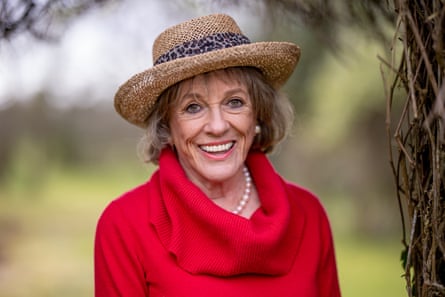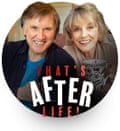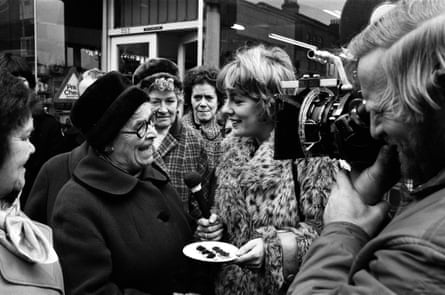Esther Rantzen: ‘I’ve become one of the funny old ladies I used to talk to in the street’
A while into my Zoom interview with Esther Rantzen, her phone rings. She apologises, says she must switch it off, answers it. “Hello,” she says. “Ah… Ah!” And she breaks into a big, familiar, toothy smile; a smile that, if you are of a certain age, will have been part of your television experience growing up. “Are you my second jab?”
The voice on the other end confirms that, yes, this is indeed her second jab. Next week, same place as the first, Milford on Sea. Fabulous news. Esther tells me she’ll take her daughter Miriam along with her in case they have any spare vaccine at the end of the day, she’s heard people have done this. Miriam who’s in her 40s (Esther forgets exactly how far into them) has myalgic encephalomyelitis, ME, but hasn’t been vaccinated. “It’s not considered an underlying health issue in spite of the fact that we know every time she gets a virus of any kind it produces a very serious relapse.”
They hope that Covid – in particular long Covid, with its similarities and links to ME, which is also known as chronic fatigue syndrome – might lead to the condition getting the attention and funding it does in America.
As well as gladly giving her second dose to her own daughter, Esther would donate it to a teacher or a supermarket worker if she could, “people who unlike me have to work in jobs that bring them into contact with people who may be infectious”.
 View image in fullscreen‘I never Zoom without my pearls’ … Esther Rantzen Photograph: Millie Pilkington/The Guardian
View image in fullscreen‘I never Zoom without my pearls’ … Esther Rantzen Photograph: Millie Pilkington/The Guardian
Esther – Dame Esther – is 80, and has been in her cottage in the New Forest since March last year, with Miriam. “We look after each other, and I haven’t found the winter difficult,” she says. Still, spring is very welcome.
I had hoped I might be able to come down and see her in person, in the garden, an excuse to escape town. But that is still not permitted. Instead, she tells me about the garden, the daffodils and primroses, budding trees and nesting birds, ponies ambling past the window. It’s where she and her late husband Desmond Wilcox planned to retire to, but he died aged 69 in 2000. The garden was his thing; his ashes are scattered here. “I used to say to him, ‘Don’t you think we’ll get bored?’ But he was right and I was wrong. And all the things I love about London – meeting friends, family, going to the theatre, restaurants – don’t exist any more.”
I want to pick her up on “cottage”, I’ve seen pictures, it’s not my idea of a cottage, how many bedrooms does it have? She laughs, and counts on her fingers. “One, two, three, four … six. Well, it was a cottage and we added bits.” Today she’s Zooming from the study. “Does that stop it being a cottage, too?”
She’s wearing a red cashmere sweater, matching red glasses, pearls (“I never Zoom without my pearls”). And a pair of big, fluffy rabbit slippers, with ears – she lifts her feet up for me to see.
I don’t know whether what I’m doing is mindfulness … but I do think ‘I’m enjoying this moment’ far more often
That’s Life!, with an exclamation mark, was a phenomenon. Presented, as well as produced, by Rantzen, it ran on BBC One from 1973 to 1994. It was funny mix – part magazine, part consumer show, with hard-hitting investigations and jokes. It was the platform from which Rantzen launched the helpline for children, Childline. It also featured funny-shaped vegetables and a dog that said “sausages”. At its peak, That’s Life got more than 20 million viewers. Twenty million!
Speaking to Esther today is a bit like an episode of That’s Life! One minute we’re talking about death, or child abuse, the next she’s doing name gags. Like “Esther rants on!” She said it. Go on, do me. “You’ve got a very nice woolly … ston, Sam,” she says, indicating my own grey sweater. Still got it.
Does she miss it, being at the centre of things? Pause. “No, because one thing Covid has taught me is quality of life is really, really important. I don’t know whether what I’m doing is mindfulness because I’m a bit confused about all that, but I do specifically think, ‘I’m enjoying this moment’ far more often. When I was working on That’s Life! sometimes I would be taking a taxi, and I would say to the driver can you stop for a moment. I’d run into Regent’s Park, past the tulips, run back to the taxi, and that was my spring. I’m not asking for sympathy; I’m just saying I was literally driven.”
In those days, women were massively underrepresented in the business. “Panorama didn’t have any women, it’s extraordinary looking back. Now I don’t think you could make a programme without at least two genders represented, which is good. But there are not many 80-year-olds, I would say that. There are older-women ghettos, like Rip Off Britain; they’re brilliant, those three, and I’m glad they’re doing it. But I’m not sure, would The One Show have a little old lady present it?”
 View image in fullscreenNew podcast … That’s After Life! Photograph: –
View image in fullscreenNew podcast … That’s After Life! Photograph: –
Rantzen certainly hasn’t stopped working, just slowed down a little. She’s doing a radio show with her other daughter, Rebecca. And a new podcast with Adrian Mills, who was with her on That’s Life! It’s called That’s After Life! Filled to the brim with news, views, comedy and commentary, life hacks (“a term I’ve only just discovered”), with more than a nod to and fond reminiscences of That’s Life! Plus guests – Michael Palin, Anton Du Beke, Barry Humphries, Imelda Staunton – gossiping and championing favourite good causes. “It’s going to have the range,” she promises.
Being 80 is fun. “When I was getting vox pops for That’s Life! I always used to seek out people of 60-plus, because they knew what they thought and didn’t care who agreed with them.” Once, at one of Frosty’s parties, she met Michael Parkinson, “and I said, ‘I’ve become one of the funny old ladies I used to talk to in the street.’” Frosty is David Frost.
 View image in fullscreenZoo stories … an April fool spoof about the beauty benefits of rhino spit. Photograph: Trinity Mirror/Mirrorpix/Alamy
View image in fullscreenZoo stories … an April fool spoof about the beauty benefits of rhino spit. Photograph: Trinity Mirror/Mirrorpix/Alamy
She gets told off by her children (as well as Miriam and Rebecca, there is a doctor son, Joshua). “I’m supposed to behave properly for my grandchildren. I once told Teddy, who was then aged five, I’d better go and sit on the naughty step and be good from now on and he said, ‘But I like you to be funny.’” Her crime? She’d told a story about her own mother being taken to London zoo as a child. “She was standing in front of the monkey cage, she was rather adenoidal and always had her mouth open, and a monkey peed straight into her mouth.”
Having grandchildren has brought back Esther’s own childhood, which she describes as very happy. “I remember my father used to come home at 6.30 and my mother used to have his slippers and a glass of sherry ready for him – can this be true? And then she would say to him, ‘How was your day, darling?’ I rapidly picked up that he had the interesting life.”
She suffered sexual abuse as a child from an older male, not a relative. She has described it as a horrible experience, but also says it was “not a serious form of abuse of the kind young people tell us on Childline. It was not the motivation for setting up the service. What motivated me was the case of a toddler who had starved to death, locked in her bedroom.”
Successive generations of children face different – and more – problems. “I know from Childline that young people are more fragile, mentally and emotionally. When we started Childline in 1986, sexual abuse was the most common problem young people got in touch with us about. It had been such a taboo and there had been so many thousands of young people who had never been able to talk about it before, threatened into silence, told horrible things would happen.”
I was talking to a Childline volunteer counsellor, who said when we started it would be rare to have one suicidal call per shift – now we could get 10 or 12
Next it was bullying. “Now mental health issues are right up the list. I was talking to one of our volunteer counsellors who has been with us from the beginning, and he said when we started it would be rare to have one suicidal call per four-hour shift, now we could get 10 or 12.”
She thinks that the corrosion of the nuclear family plays a part in it. And of larger family networks. The internet, too, social media. “I’m not sure what it is but there isn’t that feeling of being a part of a secure network with these children and young people. And something is increasing the anxiety, the fear of failure, that feeling of low self-worth.”
She’s unhappy about the war that has broken out over gender identity. “I met my first girl who believed herself to be a boy many years ago, during the run of That’s Life! She was 10, she believed herself to be a boy, she was comfortable as a boy, she wanted to be called a boy’s name. It was very clear to me that it was completely genuine, that the child needed support and to be given a way of surviving. What Childline finds is that puberty is so difficult because the body that they are already enraged with for not being as they want it to be gets worse, not better. We need to be much more understanding and caring and look after people when they’re very unhappy with their own bodies. Because it can lead to tragedy.”
 View image in fullscreen‘I was driven’ … Rantzen does a consumer vox pop for That’s Life! in February 1976. Photograph: Carl Bruin/Mirrorpix/Getty Images
View image in fullscreen‘I was driven’ … Rantzen does a consumer vox pop for That’s Life! in February 1976. Photograph: Carl Bruin/Mirrorpix/Getty Images
The doorbell rangs, Amazon delivery. Esther indicates out of the window where she wants him to leave it. “He seemed to be making That’s Life! gestures,” she says. What’s a That’s Life gesture? She points a finger, at herself, that’s what he did, a sign of recognition, Esther Rantzen!
Every generation faces different challenges. “If you think about it, people a little bit older than me were evacuated during the war.” Covid is going to make people value home and family more she thinks. “We evolved needing to cuddle and hug and share pain and worry. We’re not good at being isolated whether we’re old or young.”
We evolved needing to cuddle and hug … We’re not good at being isolated
In 2012, she set up The Silver Line, a similar service to Childline but for older people, and says that the past year might make people realise some of what they go through. “We have had that response from some of the Silver Line callers, they say, ‘Well, at least now the rest of the world understands what has been our lives, the isolation of our lives for months and years.’”
Esther’s children think she is in denial about her own mortality. It’s true, she says. “I like being stuck. My mother was never going to die. It was annoying because when she did die, in hospital, I didn’t know whether she would have preferred to be at home. I think she liked being in hospital, being looked after. She was the only person I ever met who preferred a mixed ward, she used to refer to the male patients as handsome young men, which cheered them up no end.”
She accepts she’s in denial, but says it can be useful. “In my professional life, I don’t agree with myself here, because I think in order to solve a problem you have to recognise it exists. Hence what happens with ME. Or with the abuse of children: as long as people refuse to accept it happens, or that it is as common as it is … they didn’t think it was worthwhile trying to find a way of giving children permission to talk about it and ask for help. But when it comes to my own death … yes, I prefer denial. Things have happened in my life by accident, unplanned. I suppose I hope that when death comes it will be unexpected and surprising.”
And certainly not for a long time. In the meantime, she’s very much looking forward to seeing the rest of her own family again, not on Zoom, in the flesh, here in the New Forest, hugging and cuddling them, and filling all those bedrooms with grandchildren. “I cannot, cannot wait.”
A few days later, an email. Miriam has just been invited to have her own first jab. “Hooray!”
Listen to an introduction to That’s After Life! and the first episode, with Anton Du Beke, here. The next episode, with Michael Palin, goes live on 17 March.
Childline: call 0800 1111.
The Silver Line: call 0800 4 70 80 90.



